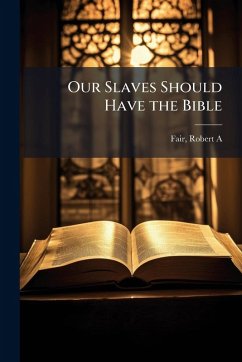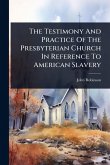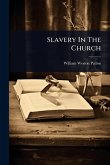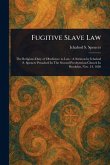"Our Slaves Should Have the Bible" is a compelling address delivered by Robert A. Fair before the Abbeville Bible Society in July 1854. This historical document offers a glimpse into the religious and social attitudes of the antebellum South concerning slavery and the role of Christianity. Fair's speech provides valuable insights into the justifications and beliefs surrounding the practice of slavery during this tumultuous period in American history. This publication is a significant resource for scholars and readers interested in the history of slavery, religious thought, and the cultural dynamics of the 19th-century United States. It sheds light on the complex interplay between faith, morality, and social structures in a society grappling with the institution of slavery. It will be a useful text for better understanding the perspectives and arguments that shaped this critical era. This work has been selected by scholars as being culturally important, and is part of the knowledge base of civilization as we know it. This work was reproduced from the original artifact, and remains as true to the original work as possible. Therefore, you will see the original copyright references, library stamps (as most of these works have been housed in our most important libraries around the world), and other notations in the work. This work is in the public domain in the United States of America, and possibly other nations. Within the United States, you may freely copy and distribute this work, as no entity (individual or corporate) has a copyright on the body of the work. As a reproduction of a historical artifact, this work may contain missing or blurred pages, poor pictures, errant marks, etc. Scholars believe, and we concur, that this work is important enough to be preserved, reproduced, and made generally available to the public. We appreciate your support of the preservation process, and thank you for being an important part of keeping this knowledge alive and relevant.
Bitte wählen Sie Ihr Anliegen aus.
Rechnungen
Retourenschein anfordern
Bestellstatus
Storno








